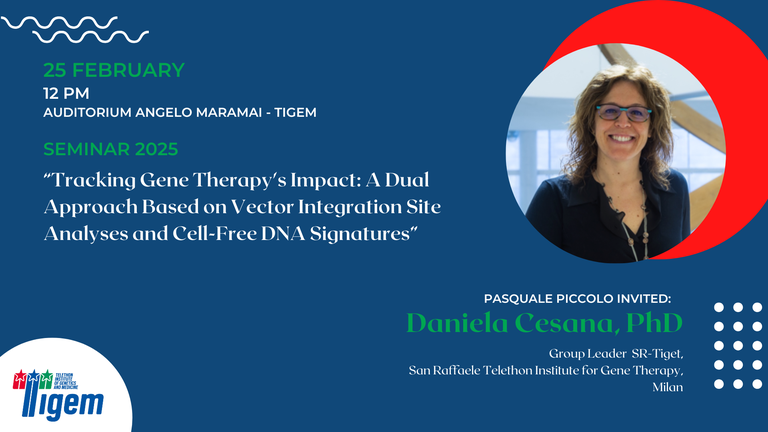Daniela Cesana, PhD - "Tracking Gene Therapy's Impact: A Dual Approach Based on Vector Integration Site Analyses and Cell-Free DNA Signatures"
- When Feb 25, 2025 from 12:00 PM to 01:15 PM (Europe/Berlin / UTC100)
- Where Tigem Auditorium Angelo Maramai
- Contact Name Pasquale Piccolo
- Contact Phone 08119230659
-
Add event to calendar
iCal

- https://www.tigem.it/newsroom/seminars/daniela-cesana-phd-tracking-gene-therapys-impact-a-dual-approach-based-on-vector-integration-site-analyses-and-cell-free-dna-signatures
- Daniela Cesana, PhD - "Tracking Gene Therapy's Impact: A Dual Approach Based on Vector Integration Site Analyses and Cell-Free DNA Signatures"
- 2025-02-25T12:00:00+01:00
- 2025-02-25T13:15:00+01:00
Daniela Cesana, PhD
Group Leader SR-Tiget,
San Raffaele Telethon Institute for Gene Therapy,
Milan
Short CV
Abstract
The research interest of my group focuses on developing and validating a cfDNA-based pipeline designed
to capture the spatiotemporal complexity of biological responses in patients undergoing gene therapy for
inherited and acquired genetic diseases. Circulating cell-free DNA (cfDNA) consists of fragments released
by healthy and diseased cells from various tissues throughout the body. By studying the tissue of origin,
cfDNA analysis enables tracing these fragments back to their source tissues and cell types. This information
is used to detect shifts in tissue composition, revealing disrupted tissue homeostasis, disease states, or
therapy-induced toxicity. Leveraging cutting-edge molecular techniques, my group aims to identify and
characterize cfDNA signatures to provide a comprehensive understanding of disease processes at the
organismal level, both before and after therapy.
We are currently applying these technologies on cfDNA in patients treated with hematopoietic stem cell GT
for the correction of inherited metabolic disorders, and by with engineered T-cells to fight hematological and
solid tumors. These disorders have been selected because in both cases, there is the need to identify
biomarkers that define disease progression and provide insights into the outcome of therapy. Therefore,
while epigenetic studies on cfDNA will capture the organism-wide changes induced by disease progression
and consequent to the treatment in a non-invasive fashion, the retrieval of integration sites on cfDNA will
provide molecular insights into the activity, clonality and persistence of engineered cells in peripheral
organs. By correlating patient-derived cfDNA signatures with clinical variables outcomes, I will establish if
these analyses can predict the impact of engineered cells at the whole organismal level potentially
highlighting mechanisms of therapeutic success and failure that have not yet been explored. The advanced
knowledge gained with this project may prompt a more accurate diagnosis evaluation, assist in selecting
patients who will benefit from GT, and provide early insights on the efficacy and toxicity of cellular therapies
guiding for a more personalized therapeutic intervention to reduce inter-individual variability.
Group Leader SR-Tiget,
San Raffaele Telethon Institute for Gene Therapy,
Milan
Short CV
Abstract
The research interest of my group focuses on developing and validating a cfDNA-based pipeline designed
to capture the spatiotemporal complexity of biological responses in patients undergoing gene therapy for
inherited and acquired genetic diseases. Circulating cell-free DNA (cfDNA) consists of fragments released
by healthy and diseased cells from various tissues throughout the body. By studying the tissue of origin,
cfDNA analysis enables tracing these fragments back to their source tissues and cell types. This information
is used to detect shifts in tissue composition, revealing disrupted tissue homeostasis, disease states, or
therapy-induced toxicity. Leveraging cutting-edge molecular techniques, my group aims to identify and
characterize cfDNA signatures to provide a comprehensive understanding of disease processes at the
organismal level, both before and after therapy.
We are currently applying these technologies on cfDNA in patients treated with hematopoietic stem cell GT
for the correction of inherited metabolic disorders, and by with engineered T-cells to fight hematological and
solid tumors. These disorders have been selected because in both cases, there is the need to identify
biomarkers that define disease progression and provide insights into the outcome of therapy. Therefore,
while epigenetic studies on cfDNA will capture the organism-wide changes induced by disease progression
and consequent to the treatment in a non-invasive fashion, the retrieval of integration sites on cfDNA will
provide molecular insights into the activity, clonality and persistence of engineered cells in peripheral
organs. By correlating patient-derived cfDNA signatures with clinical variables outcomes, I will establish if
these analyses can predict the impact of engineered cells at the whole organismal level potentially
highlighting mechanisms of therapeutic success and failure that have not yet been explored. The advanced
knowledge gained with this project may prompt a more accurate diagnosis evaluation, assist in selecting
patients who will benefit from GT, and provide early insights on the efficacy and toxicity of cellular therapies
guiding for a more personalized therapeutic intervention to reduce inter-individual variability.
